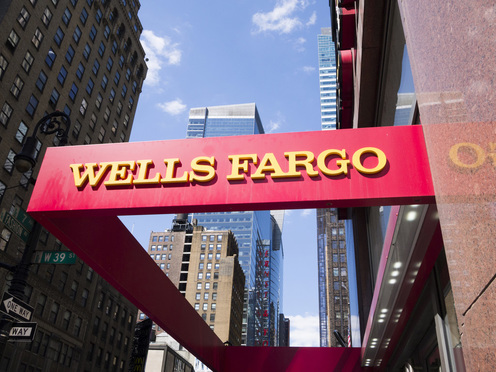Inside Wells Fargo's Quest Against a Whistleblower Awarded $577K
Recently disclosed documents obtained through a Freedom of Information Act request offer a deep glimpse into the bank's efforts to contest bank manager Claudia Ponce de Leon's claims that she was unlawfully fired for complaining about corporate malfeasance.
December 14, 2017 at 12:41 PM
8 minute read

Through public statements and congressional hearings, Wells Fargo & Co. executives have regularly expressed regret for the sales-practice scandal that rocked the bank a year ago.
Behind the scenes, Wells Fargo and its outside lawyers at Seyfarth Shaw and Gibson, Dunn & Crutcher have been less repentant. The bank has vigorously contested a former California branch manager's claim that she was fired for blowing the whistle on the sales scandal, where bank employees opened millions of new accounts without authorization.
Recently disclosed documents obtained through a Freedom of Information Act request offer a deep glimpse into the bank's efforts to contest bank manager Claudia Ponce de Leon's claims that she was unlawfully fired for complaining about corporate malfeasance. The documents, provided to ALM, show how Wells Fargo's lawyers, between 2012 and this year, sought to prove Ponce de Leon was a problematic employee who was terminated for reasons unrelated to her concerns about deceptive sales practices.
The U.S. Department of Labor 's Occupational Safety and Health Administration this year ordered Wells Fargo to pay Ponce de Leon more than $577,500 in back wages, damages and legal fees after finding the bank retaliated against her. Wells Fargo has continued to contest Ponce de Leon's retaliation claims. A hearing before an administrative law judge has been set for June 2018.
“What stunned me more than anything is they're continuing to fight. That's, I think, the one thing that surprised me,” said Ponce de Leon's attorney, Yosef Peretz of Peretz & Associates in San Francisco. “There's a mountain of evidence piling up on a daily basis about what they've done. Los Angeles was the hub of fraudulent activity, and my client was right there in the thick of it.”
Represented by Gibson Dunn partner Karl Nelson, the bank moved in August to appeal the Labor Department's decision. Lawyers for Wells Fargo argued then that Ponce de Leon “was terminated based upon a pattern of significant misconduct unrelated to any alleged whistleblowing and that, accordingly, [she] is not entitled to any relief.”
Wells Fargo said in a statement that the bank has requested a full hearing on Ponce de Leon's claims because of the specific facts of her case, many of which are supported by witnesses whom OSHA never interviewed.”
The statement continued: “Ms. Ponce de Leon was terminated because other team members repeatedly raised concerns about how she was treating them. We owe it to the team members who raised those concerns to allow for a full hearing so that their side of the story regarding Ms. Ponce de Leon's conduct can be heard before any final determination is made on reinstating a manager who failed to comply with our vision and values. At the end of a full and fair process, whichever way it comes out, we will comply with the outcome.”
The bank is grappling with a number of whistleblower retaliation complaints. Just days before appealing the OSHA decision in Ponce de Leon's case, Wells Fargo disclosed it is facing a “multitude” of complaints filed under the whistleblower protection provisions of the Sarbanes-Oxley Act, along with ”state law whistleblower actions filed with the Department of Labor or in various state courts alleging adverse employment actions for raising sales practice misconduct issues.”
What follows are a snapshot of the arguments Wells Fargo made in fighting Ponce de Leon's retaliation claims.
Wells Fargo's arguments about management style.
Wells Fargo was represented during the OSHA investigation by Seyfarth Shaw partner Eric Steinert. In March 2012, Steinert laid out Wells Fargo's initial case for firing Ponce de Leon, arguing that employees frequently complained about her “abrasive and confrontational management style.”
Those complaints, Steinert wrote, painted Ponce de Leon as “someone who was paranoid about what others might say about her, and who would confront employees regarding whether anyone had said anything negative about her.” Ponce de Leon was counseled about her management style, according to Wells Fargo.
Following a “climate review” of her branch in 2007, she was advised to improve her interactions with co-workers. A final warning came in 2010, when she was transferred to another branch because “relations were so strained with her team members.”
Almost immediately after the transfer to what would be her final branch, another review found that Ponce de Leon's co-workers viewed her as confrontational “and just downright rude,” Steinert wrote.
Peretz said Ponce de Leon joined Wells Fargo as a bank teller at age 19 and worked her way up, earning performance reviews he described as “stellar.”
Wells Fargo, he said, has followed a corporate blueprint for fighting whistleblower retaliation claims. “That's the way big corporations fend off claims—arguing that she was a bad employee, in essence. The problem is, she has a very good track record,” Peretz said in an interview. “It's a classic story of someone who's trying to do the right thing and the system goes against her.”
About that $185 million settlement in 2016.
In September 2016, Wells Fargo agreed to pay $185 million as part of a settlement with federal regulators and the Los Angeles City Attorney's Office over the sales practice scandal. At the time, Wells Fargo said employees had opened up to 2.1 million potentially unauthorized accounts. The bank later disclosed that the scandal was broader than it first believed, saying it had identified 3.5 million accounts that customers may not have authorized.
A month after Wells Fargo agreed to the settlement, which included a record-setting $100 million civil penalty paid to the Consumer Financial Protection Bureau, the bank faced an amended complaint alleging that it violated the whistleblower provisions of the Consumer Financial Protection Act.
According to the bank's lawyers, Ponce de Leon has argued she is owed more than $3 million in penalties under the Consumer Financial Protection Act “based generically on Wells Fargo's alleged knowledge of improper sales practices.”
Wells Fargo argued that Ponce de Leon lacked standing to seek penalties. Regardless, its lawyer argued, the CFPB's portion of the 2016 settlement prevented her from pursuing penalties under the Consumer Financial Protection Act.
“The issue of Wells Fargo's liability under the CFPB has, in any event, already been resolved,” Steinert wrote.
“Even if Ms. [Ponce de Leon] could otherwise seek Section 5565 civil penalties as a matter of law (which she cannot), the penalties she seeks have already been resolved by the consent order,” he added.
'Wells Fargo was the only victim.'
Announcing its decision against Wells Fargo last year, OSHA said the bank fired Ponce de Leon after she blew the whistle on at least three subordinates—identified as “private bankers” working under her—for opening accounts without proper authorization.
But, as recently as June, Wells Fargo argued that Ponce de Leon was exaggerating her whistleblowing efforts.
“In an effort to inflate the significance of her single EthicsLine complaint, Ms. [Ponce de Leon] exaggerates the facts to portray herself as an ethical crusader,” Steinert wrote. “Contrary to the characterizations in her most recent submission, however, she never raised concerns about 'systemic ethical violations.'”
After investigating Ponce de Leon's complaint, Wells Fargo promptly fired the employee for creating “fictitious accounts.”
“No customers were impacted; Wells Fargo was the only victim,” Steinert wrote.
Read more:
Wells Fargo's Whistleblower Problem Could Grow Substantially
Wells Fargo Whistleblower in Sham-Accounts Scandal Wins Reinstatement, Back Pay
OSHA Awards Wells Fargo Appeals Whistleblower $577K
Wells Fargo GC Allen Parker Helps Restore Integrity to Embattled Financial Giant
Wells Fargo CEO Promises Compliance Reform at Senate Hearing
This content has been archived. It is available through our partners, LexisNexis® and Bloomberg Law.
To view this content, please continue to their sites.
Not a Lexis Subscriber?
Subscribe Now
Not a Bloomberg Law Subscriber?
Subscribe Now
NOT FOR REPRINT
© 2025 ALM Global, LLC, All Rights Reserved. Request academic re-use from www.copyright.com. All other uses, submit a request to [email protected]. For more information visit Asset & Logo Licensing.
You Might Like
View All
Trump Fires EEOC Commissioners, Kneecapping Democrat-Controlled Civil Rights Agency

Testing Legal Authority, Trump Fires NLRB Member, Leaving Panel Without Quorum
3 minute read

Trending Stories
- 1ACC CLO Survey Waves Warning Flags for Boards
- 2States Accuse Trump of Thwarting Court's Funding Restoration Order
- 3Microsoft Becomes Latest Tech Company to Face Claims of Stealing Marketing Commissions From Influencers
- 4Coral Gables Attorney Busted for Stalking Lawyer
- 5Trump's DOJ Delays Releasing Jan. 6 FBI Agents List Under Consent Order
Who Got The Work
J. Brugh Lower of Gibbons has entered an appearance for industrial equipment supplier Devco Corporation in a pending trademark infringement lawsuit. The suit, accusing the defendant of selling knock-off Graco products, was filed Dec. 18 in New Jersey District Court by Rivkin Radler on behalf of Graco Inc. and Graco Minnesota. The case, assigned to U.S. District Judge Zahid N. Quraishi, is 3:24-cv-11294, Graco Inc. et al v. Devco Corporation.
Who Got The Work
Rebecca Maller-Stein and Kent A. Yalowitz of Arnold & Porter Kaye Scholer have entered their appearances for Hanaco Venture Capital and its executives, Lior Prosor and David Frankel, in a pending securities lawsuit. The action, filed on Dec. 24 in New York Southern District Court by Zell, Aron & Co. on behalf of Goldeneye Advisors, accuses the defendants of negligently and fraudulently managing the plaintiff's $1 million investment. The case, assigned to U.S. District Judge Vernon S. Broderick, is 1:24-cv-09918, Goldeneye Advisors, LLC v. Hanaco Venture Capital, Ltd. et al.
Who Got The Work
Attorneys from A&O Shearman has stepped in as defense counsel for Toronto-Dominion Bank and other defendants in a pending securities class action. The suit, filed Dec. 11 in New York Southern District Court by Bleichmar Fonti & Auld, accuses the defendants of concealing the bank's 'pervasive' deficiencies in regards to its compliance with the Bank Secrecy Act and the quality of its anti-money laundering controls. The case, assigned to U.S. District Judge Arun Subramanian, is 1:24-cv-09445, Gonzalez v. The Toronto-Dominion Bank et al.
Who Got The Work
Crown Castle International, a Pennsylvania company providing shared communications infrastructure, has turned to Luke D. Wolf of Gordon Rees Scully Mansukhani to fend off a pending breach-of-contract lawsuit. The court action, filed Nov. 25 in Michigan Eastern District Court by Hooper Hathaway PC on behalf of The Town Residences LLC, accuses Crown Castle of failing to transfer approximately $30,000 in utility payments from T-Mobile in breach of a roof-top lease and assignment agreement. The case, assigned to U.S. District Judge Susan K. Declercq, is 2:24-cv-13131, The Town Residences LLC v. T-Mobile US, Inc. et al.
Who Got The Work
Wilfred P. Coronato and Daniel M. Schwartz of McCarter & English have stepped in as defense counsel to Electrolux Home Products Inc. in a pending product liability lawsuit. The court action, filed Nov. 26 in New York Eastern District Court by Poulos Lopiccolo PC and Nagel Rice LLP on behalf of David Stern, alleges that the defendant's refrigerators’ drawers and shelving repeatedly break and fall apart within months after purchase. The case, assigned to U.S. District Judge Joan M. Azrack, is 2:24-cv-08204, Stern v. Electrolux Home Products, Inc.
Featured Firms
Law Offices of Gary Martin Hays & Associates, P.C.
(470) 294-1674
Law Offices of Mark E. Salomone
(857) 444-6468
Smith & Hassler
(713) 739-1250






